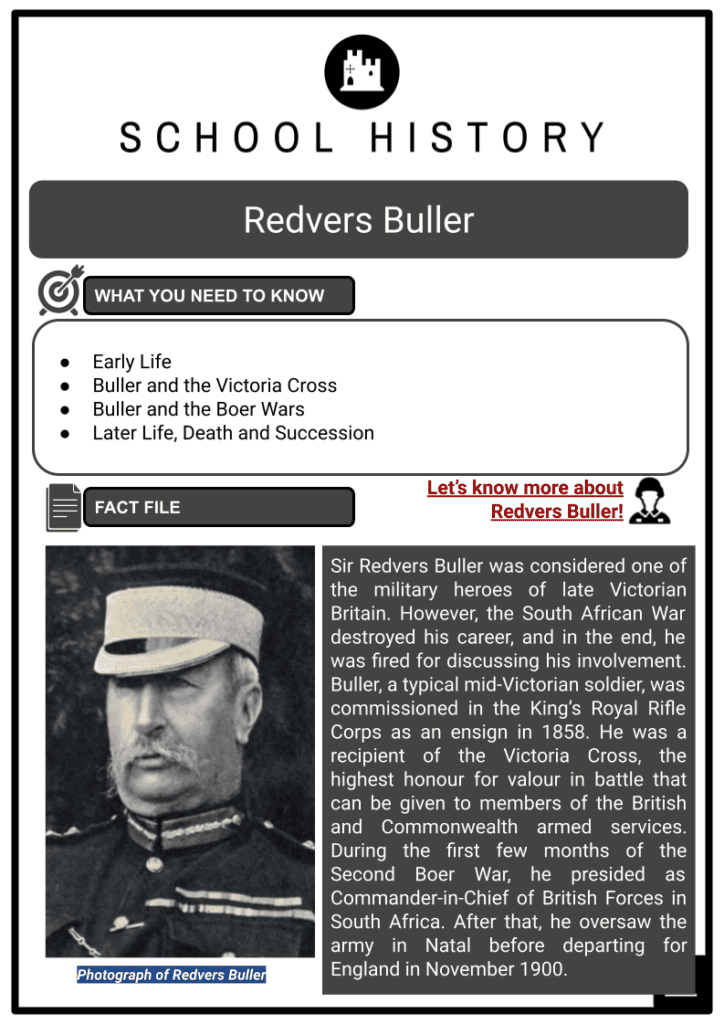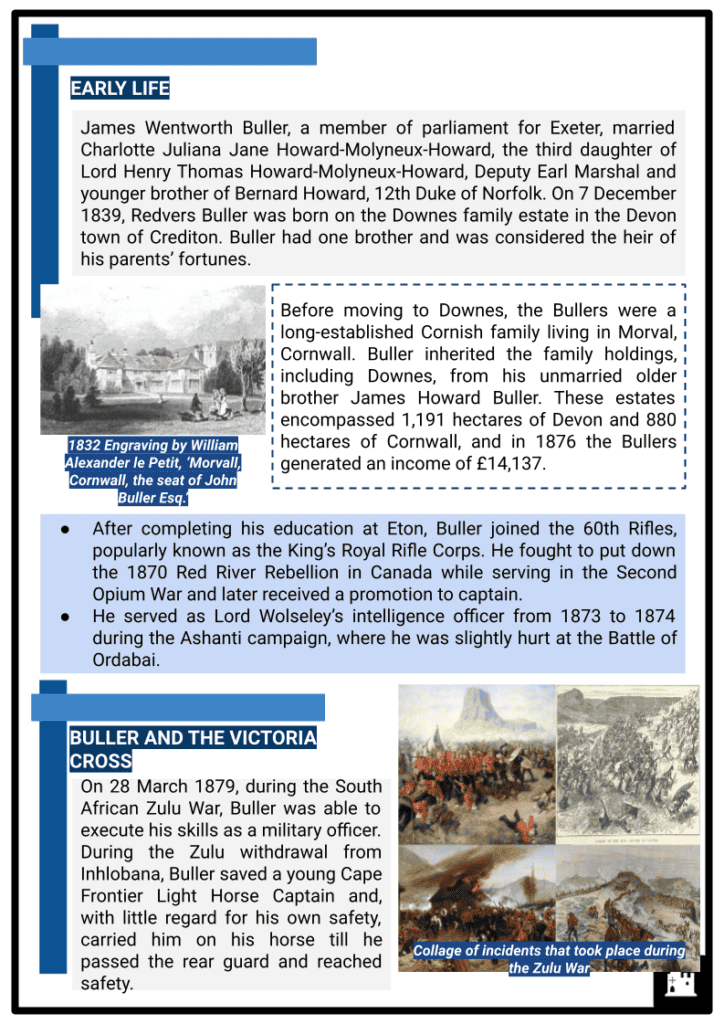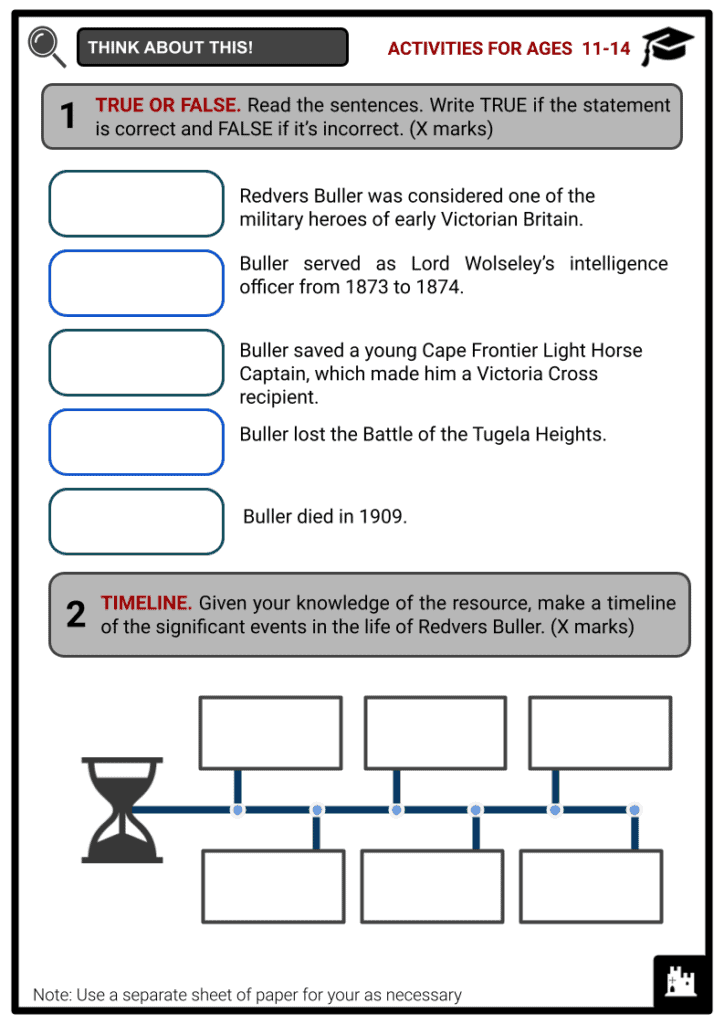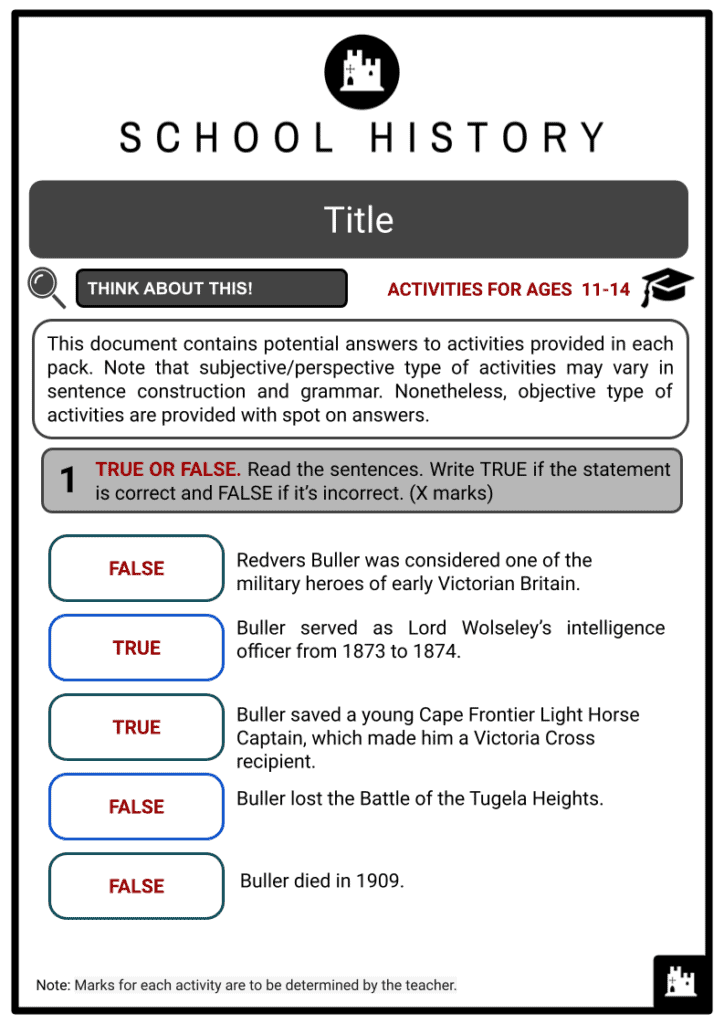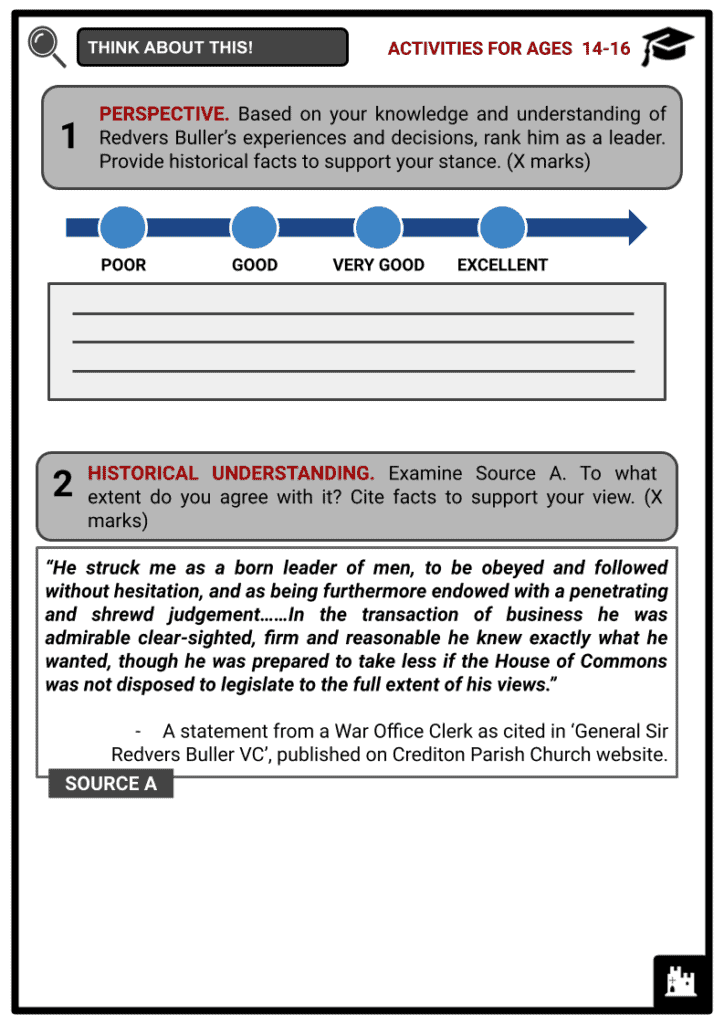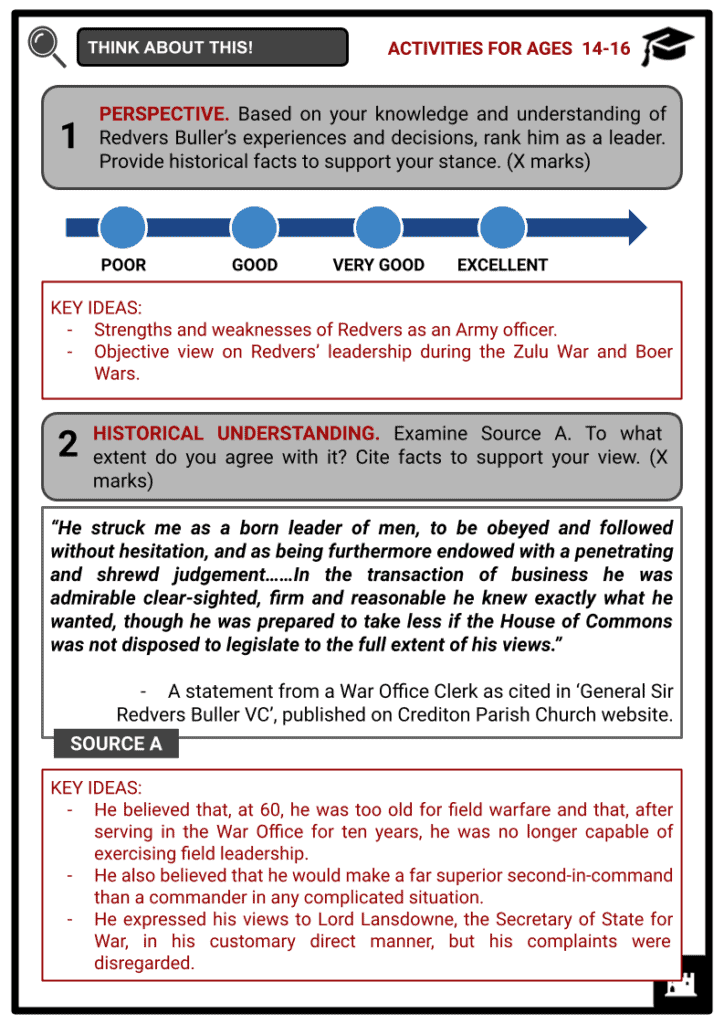Redvers Buller Worksheets
Do you want to save dozens of hours in time? Get your evenings and weekends back? Be able to teach about Redvers Buller to your students?
Our worksheet bundle includes a fact file and printable worksheets and student activities. Perfect for both the classroom and homeschooling!
Summary
- Early Life
- Buller and the Victoria Cross
- Buller and the Boer Wars
- Later Life, Death and Succession
Key Facts And Information
Let’s know more about Redvers Buller!
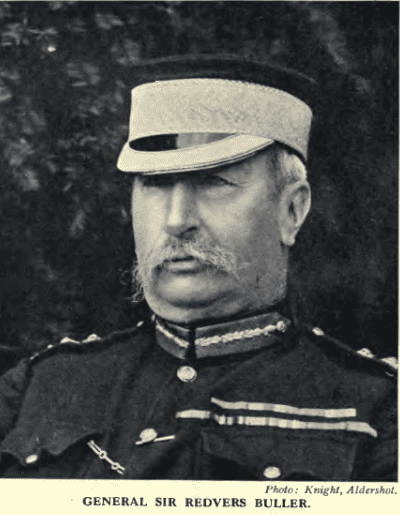
Sir Redvers Buller was considered one of the military heroes of late Victorian Britain. However, the South African War destroyed his career, and in the end, he was fired for discussing his involvement. Buller, a typical mid-Victorian soldier, was commissioned in the King’s Royal Rifle Corps as an ensign in 1858. He was a recipient of the Victoria Cross, the highest honour for valour in battle that can be given to members of the British and Commonwealth armed services. During the first few months of the Second Boer War, he presided as Commander-in-Chief of British Forces in South Africa. After that, he oversaw the army in Natal before departing for England in November 1900.
EARLY LIFE
- James Wentworth Buller, a member of parliament for Exeter, married Charlotte Juliana Jane Howard-Molyneux-Howard, the third daughter of Lord Henry Thomas Howard-Molyneux-Howard, Deputy Earl Marshal and younger brother of Bernard Howard, 12th Duke of Norfolk. On 7 December 1839, Redvers Buller was born on the Downes family estate in the Devon town of Crediton. Buller had one brother and was considered the heir of his parents’ fortunes.
- Before moving to Downes, the Bullers were a long-established Cornish family living in Morval, Cornwall. Buller inherited the family holdings, including Downes, from his unmarried older brother James Howard Buller. These estates encompassed 1,191 hectares of Devon and 880 hectares of Cornwall, and in 1876 the Bullers generated an income of £14,137.
- After completing his education at Eton, Buller joined the 60th Rifles, popularly known as the King’s Royal Rifle Corps. He fought to put down the 1870 Red River Rebellion in Canada while serving in the Second Opium War and later received a promotion to captain.
- He served as Lord Wolseley’s intelligence officer from 1873 to 1874 during the Ashanti campaign, where he was slightly hurt at the Battle of Ordabai.
BULLER AND THE VICTORIA CROSS
- On 28 March 1879, during the South African Zulu War, Buller was able to execute his skills as a military officer. During the Zulu withdrawal from Inhlobana, Buller saved a young Cape Frontier Light Horse Captain and, with little regard for his own safety, carried him on his horse till he passed the rear guard and reached safety.
- Buller oversaw the mounted infantry of Sir Evelyn Wood’s northern British column during the Zulu War. Buller participated in the British defeat at the Battle of Hlobane, when he received the Victoria Cross (VC) for displaying courage in the face of danger. He participated in the British triumph at the Battle of Kambula the next day.
- The VC is awarded to the “...most outstanding bravery, or some gallant or outstanding act of valour or self-sacrifice, or extreme devotion to duty in the presence of the enemy.”
- The Victoria Cross is the highest honour for courage given by the United Kingdom (UK), which is usually the first award presented at an investiture, even before knighthoods.
- The VC is the first decoration worn in a row of medals and the first set of post-nominal letters used to denote any decoration or order because of its prestige.
BULLER AND THE BOER WARS
First Boer War
- Buller served as Sir Evelyn Wood’s chief of staff during the First Boer War in 1881, and the following year he was knighted while serving once more as director of intelligence during the Egypt campaign. In 1882, Buller married Audrey, the daughter of the 4th Marquess Townshend. That same year, he was assigned command of an infantry brigade and dispatched to the Sudan. He took part in the battles of El Teb and Tamai and the 1885 mission to relieve General Gordon.
- Buller received a major general promotion. In 1886, he was dispatched to Ireland to oversee an investigation into police officers’ side jobs. The following year, he returned to the Army as Quartermaster-General to the Forces.
- On 4 May 1892, Buller was named Honorary Colonel of the Devonshire Regiment’s 1st Volunteer Battalion. When the Duke of Cambridge retired in 1895, Lord Rosebery’s government anticipated him to take over as commander-in-chief of the British Army.
- However, the government was overthrown, and Lord Wolseley was named commander-in-chief of the army in its place. Buller received a promotion to full general on 24 June 1896.
Second Boer War
- In 1898, Buller was appointed commander of the troops stationed at Aldershot. When the Second Boer War broke out in 1899, he was appointed commander of the Natal Field Force. By the beginning of September 1899, Buller had serious concerns that the Boers could not be easily browbeaten and that White’s forces in Natal might suffer some consequences if they deployed too far forward.
- During what would later be known as Black Week, Buller lost the Battle of Colenso. Forces under his leadership also took part in the defeats at the Battle of Stormberg and Magersfontein.
- In January 1900, Lord Roberts took over as overall commander in South Africa due to worries about his performance and unfavourable field reports. Buller’s defeats and dubious leadership skills eventually earned him the ‘Reverse Buller’ title among the troops.
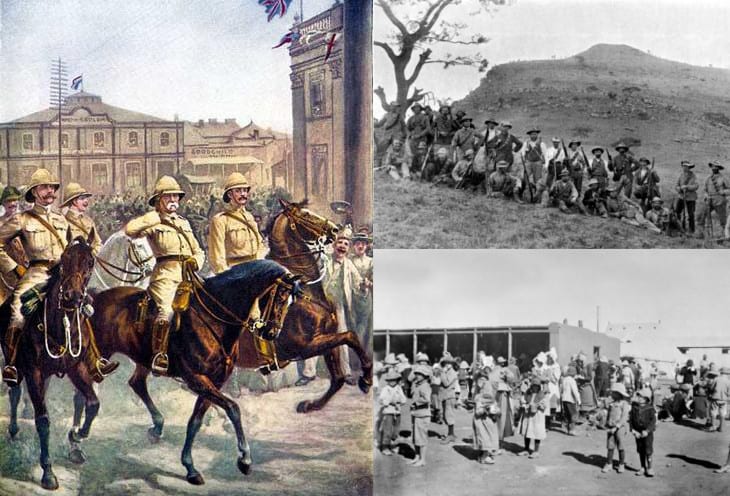
Collage depicting the Boer Wars incidents during the Scramble for Africa - At the battles of Spion Kop and Vaal Krantz, Buller attempted to relieve Ladysmith but encountered two more failures. Ladysmith is a city in the Uthukela District of KwaZulu-Natal, South Africa. He stayed in his position as second-in-command. He won the Battle of the Tugela Heights on his fourth try, lifting the siege on 28 February 1900, the day Piet Cronjé finally submitted to Roberts at Paardeberg. Buller foresaw the Boers turning to guerrilla warfare after Roberts captured Bloemfontein. At Biggarsberg, Laing’s Nek and Lydenburg later on, he successfully forced Boer armies out of their strongholds. The final set-piece battle of the conflict, the Battle of Bergendal, was won by Buller’s troops.
- When Buller returned triumphantly from South Africa on 10 November 1900 to resume his duties as General Officer Commanding Aldershot District, it became known as a Buller day. It was one of many public celebrations marking his triumph.
- Buller was also well-known among the general public in England as a military leader. In the following months, he delivered speeches and lectures on the war. In November 1900, he was elevated to Knight Grand Cross of the Order of St Michael and St George (GCMG), and in April 1901, he was granted the Honorary Freedom of the Borough of Plymouth.
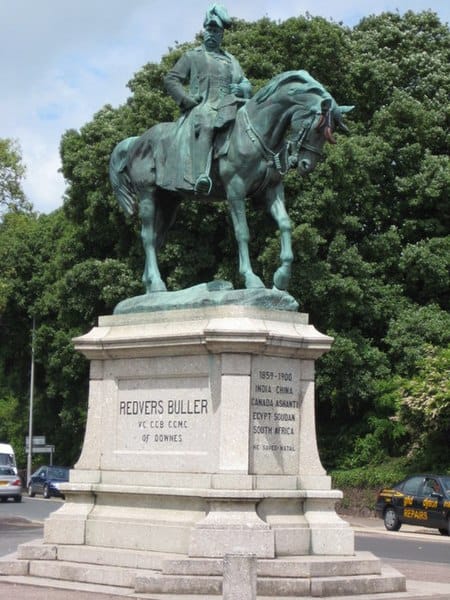
1905 bronze Equestrian statue of Sir Redvers Buller in Exeter - However, Buller’s early failures in South Africa, particularly within the Unionist administration, had hurt his reputation. The Minister for War, St John Brodrick, and Lord Roberts looked for a scapegoat when public unease over the vanquished Boers’ ongoing guerrilla actions was revealed. The change was made possible by the frequent criticisms of the British Army’s performance in the newspapers.
- When Buller was called in for a meeting on 17 October 1901, Brodrick and Roberts seized the chance to seek his resignation for violating military discipline. Roberts backed them up in this demand. Buller was promptly fired on 22 October 1901 with half pay for his refusal.
LATER LIFE, DEATH & SUCCESSION
- There were several public displays of support for Buller, particularly in the West Country, where a significant statue by Adrian Jones depicting Buller riding his war horse was constructed in Exeter on the road leading from his hometown of Crediton in 1905, thanks to public donations. Buller maintained a low-key retirement until accepting the position of Principal Warden of the Goldsmiths’ Company on 29 May 1907, a position he held until he died in 1908.
- Buller passed away on 2 June 1908 at Downes House, the family home near Crediton, Devon. He was buried in the churchyard of Holy Cross Church. The entire western side of the church’s chancel arch is a detailed memorial to Buller. He had no male heirs. So his younger brother Arthur Tremayne Buller succeeded him in the family holdings.
Frequently Asked Questions
- Who was Sir Redvers Buller?
Sir Redvers Buller was a British Army officer who achieved prominence during the 19th century. He served in various military campaigns, notably the Zulu War and the Second Boer War.
- What were Buller's tactics in the Boer War?
During the Second Boer War, Redvers Buller initially relied on frontal assaults but faced setbacks. He adapted his tactics, employing flanking manoeuvres, night marches, and improved artillery usage. He emphasised scouting, coordination with other forces, and building blockhouses and defensive lines. Despite some successes, his overall performance remains a subject of historical debate.
- Who won the Boer War?
The British won the Boer War, annexing the Boer Republics into the British Empire. The war ended with the Treaty of Vereeniging in 1902.

